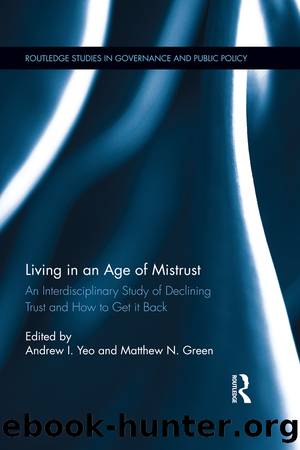Living in an Age of Mistrust by Andrew I Yeo & Matthew N. Green

Author:Andrew I Yeo & Matthew N. Green [Yeo, Andrew I & Green, Matthew N.]
Language: eng
Format: epub
ISBN: 9781138735941
Google: V2SLAQAACAAJ
Goodreads: 34499089
Publisher: Routledge
Published: 2017-01-15T10:43:57+00:00
Effects of Elite-Level Mistrust
This apparent decline in trust among elected officials both within and across branches of government may contribute to the publicâs reduced trust in their government in at least two ways. First, it may encourage like-minded constituents to share that distrust. If your member of Congress is someone you agree with, and that person says the Speaker of the House, the president, or members of the other party cannot be trusted, why should you? One analysis found that people who dislike Congress are more likely to explain their dislike as a function of the people within itârather than policy outcomes or how Congress worksâwhich suggests that legislatorsâ public distrust of each other may play a big role in the publicâs distaste for the institution.32 At a minimum, the strong partisan rhetoric lawmakers employâwhether intentionally or notâmay heighten mistrust. In a 2013 poll, respondentsâ most common answer to the question of what they distrusted most about government was that it was âseemingly more concerned with partisanship and infighting instead of the average person.â33 As Senator Ben Sasse (R-ND) pointedly remarked in his 2015 maiden floor speech, Socrates believed it was âdishonorableâ to make poor arguments or misrepresent your opponentâs claims,
yet here on this floor we regularly devolve into a kind of bizarre politician speech. We hear the robotic recitation of talking points. Well, guess what? Normal people donât talk like this. They donât like that we do, and more important than whether or not they like us, they donât trust their government because we do.34
Second, by hindering legislative cooperation, declining trust both within and across branches may reduce the effectiveness of government, create policy deadlock, increase legislative obstruction, and thereby contribute to citizensâ low view of their government and its leaders. According to one study, just over a quarter of individuals unhappy with the legislative process of Congress felt that way because legislators were unwilling to work with each other or with the president, while a recent survey found that over 70 percent of people who disapproved of Congress felt that way either because of Congressâs âgeneral ineffectivenessâ or âobstructionism,â including âfighting against Obama.â35 As previously noted, House Speaker Boehner had doubts about the trustworthiness of Obama as Congress attempted to negotiate with the White House over the federal budget in mid-2011, and as a default on the federal debt loomed, âObama stepped back from direct negotiations with Republicansâ in the House while Boehner at one point stopped returning the presidentâs phone calls. An agreement was reached only because Senate Minority Leader Mitch McConnell (R-KY), âconcerned that other Democrats, especially Obama, would prove to be less trustworthy bargaining partners,â negotiated instead with Vice President Joe Biden, someone with whom McConnell believed he could trust based on âtheir long-term relationship across partisan lines.â But the last-minute agreement, reached amid a panoply of news stories about the global economic calamity that would ensue without it, may have nonetheless weakened votersâ trust in the federal government. It may be no coincidence that
Download
This site does not store any files on its server. We only index and link to content provided by other sites. Please contact the content providers to delete copyright contents if any and email us, we'll remove relevant links or contents immediately.
The Secret History by Donna Tartt(19088)
The Social Justice Warrior Handbook by Lisa De Pasquale(12190)
Thirteen Reasons Why by Jay Asher(8910)
This Is How You Lose Her by Junot Diaz(6887)
Weapons of Math Destruction by Cathy O'Neil(6280)
Zero to One by Peter Thiel(5802)
Beartown by Fredrik Backman(5754)
The Myth of the Strong Leader by Archie Brown(5507)
The Fire Next Time by James Baldwin(5446)
How Democracies Die by Steven Levitsky & Daniel Ziblatt(5219)
Promise Me, Dad by Joe Biden(5153)
Stone's Rules by Roger Stone(5088)
A Higher Loyalty: Truth, Lies, and Leadership by James Comey(4964)
100 Deadly Skills by Clint Emerson(4925)
Rise and Kill First by Ronen Bergman(4789)
Secrecy World by Jake Bernstein(4753)
The David Icke Guide to the Global Conspiracy (and how to end it) by David Icke(4720)
The Farm by Tom Rob Smith(4513)
The Doomsday Machine by Daniel Ellsberg(4490)
